“Whoever wishes to foresee the future must consult the past; for human events ever resemble those of preceding times. This arises from the fact that they are produced by men who ever have been, and ever shall be, animated by the same passions, and thus they necessarily have the same results.”
~Machiavelli
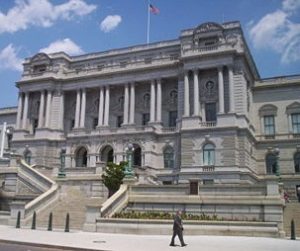
1800 – President John Adams approved legislation to appropriate $5,000 to purchase “such books as may be necessary for the use of Congress,” thus establishing the Library of Congress. Twelve years later, the British army invaded the city of Washington and burned the Capitol, including the then 3,000-volume Library of Congress.
Former president Thomas Jefferson, who advocated the expansion of the library during his two terms in office, responded to the loss by selling his personal library, the largest and finest in the country, to Congress.
In 1851, a second major fire at the library destroyed about two-thirds of its 55,000 volumes, including two-thirds of the Thomas Jefferson library. Congress responded quickly and generously to the disaster, and within a few years a majority of the lost books were replaced.
After the Civil War, the collection was greatly expanded, and by the 20th century the Library of Congress had become the de facto national library of the United States and one of the largest in the world.
Today, the collection, housed in three enormous buildings in Washington, contains more than 17 million books, as well as millions of maps, manuscripts, photographs, films, audio and video recordings, prints, and drawings.
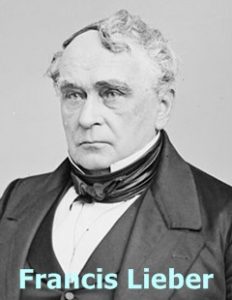
1863 – The Union army issued General Orders No. 100, which provided a code of conduct for Federal soldiers and officers when dealing with Confederate prisoners and civilians.
The orders were the brainchild of Francis Lieber, a Prussian immigrant whose three sons had served during the Civil War. One son was mortally wounded while fighting for the Confederacy at the Battle of Williamsburg, Virginia, in 1862. Lieber’s other two sons fought for the Union.
General Henry Halleck, general-in-chief of the Union armies, appointed a committee of four generals and Lieber to draft rules of combat for the Civil War. The final document consisted of 157 articles written almost entirely by Lieber. The orders established policies for, among other things, the treatment of prisoners, exchanges, and flags of truce.
There was no document like it in the world at the time, and it became the standard for international military law,
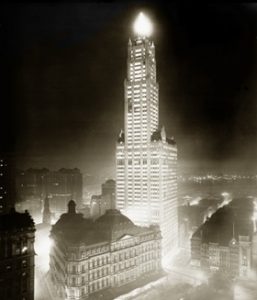
1913 – With lights turned on by way of a button in Washington, D.C., President Woodrow Wilson officially opened the Woolworth Building in New York City. With a height of 792 feet and 60 stories tall, it was, at the time, the tallest in the world, and would remain so until 1930 and the opening of 40 Wall Street, also known as the Trump Building.
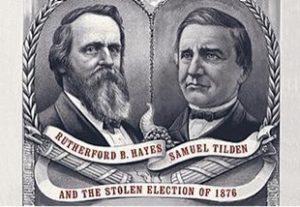
1877 – Federal troops were ordered out of New Orleans, ending the North’s post-Civil War rule in the South. The action came as a result of the Compromise of 1877 which handed the 1876 presidential election to Rutherford B. Hayes.
The Background: The results of the election remain among the most controversial ever, although it is not disputed that Samuel Tilden (D-NY) outpolled Hayes (R-OH) in the popular vote. After a first count of votes, Tilden won 184 electoral votes to 165 for Hayes, with 20 votes from four states (Louisiana, Florida, S. Carolina and Oregon) unresolved. 185 electoral votes were necessary to claim victory.
Facing an unprecedented constitutional crisis, the Congress of the United States passed a law on January 29, 1877 that formed a 15-member Electoral Commission to settle the result. After a series of 8–7 votes, the commission gave all 20 disputed electoral votes to Hayes, giving Hayes a 185–184 electoral vote victory.
During intense closed-door meetings, Democratic leaders agreed with reluctance to accept Hayes as president in return for the withdrawal of Federal troops from the last two still-occupied Southern states, South Carolina and Louisiana. Once the parties had agreed to these terms, the Hayes’ electors were selected and he was named president two days before the inauguration.
To the four million former slaves in the South, the Compromise of 1877 was the “Great Betrayal”. Republican efforts to assure civil rights for the blacks were totally abandoned. The white population of the country was anxious to get on with making money. No serious move to restore the rights of black citizens would surface again until the 1950s.

1908 – A single tornado traveled 150 miles through Louisiana and Mississippi, leaving 143 dead in its wake. Tornadoes on average travel four to eight miles along the ground at about 60 miles per hour. This one traveled more than 150 miles.
Two of the locations worst hit by the single extraordinary tornado were Amite, Louisiana, and Purvis, Mississippi. In Amite, the tornado was 2.5 miles wide as it touched the ground, killing 29 residents. In Purvis, 55 people were killed and 400 were injured.
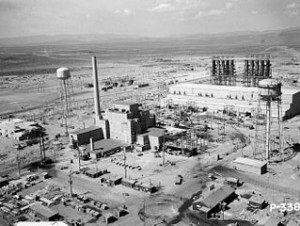
1945 – President Harry Truman learned the full details of the Manhattan Project, in which scientists were attempting to create the first atomic bomb. The information thrust upon Truman a momentous decision: whether or not to use the world’s first weapon of mass destruction.
America’s secret development of the atomic bomb began in 1939 with then-President Franklin Roosevelt’s support. The project was so secret that FDR did not even inform his fourth-term vice president, Truman, that it existed.
In fact, when Truman’s 1943 senatorial investigations into war-production expenditures led him to ask questions about a suspicious plant in Minneapolis, which was secretly connected with the Manhattan Project, Truman received a stern phone call from FDR’s secretary of war, Harry Stimson, warning him not to inquire further.
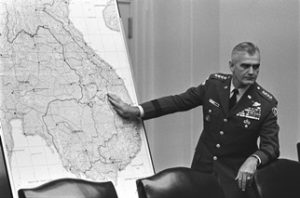
1967 – At a news conference in Washington, Gen. William Westmoreland, senior U.S. commander in South Vietnam, caused controversy by saying that the enemy had “gained support in the United States that gives him hope that he can win politically that which he cannot win militarily.”
Although he said “Ninety-five percent of the people were behind the United States effort in Vietnam,” he asserted that the American soldiers in Vietnam were “dismayed, and so am I, by recent unpatriotic acts at home.”
This criticism of the antiwar movement was not received well by many in and out of the antiwar movement, who believed it was both their right and responsibility to speak out against the war.
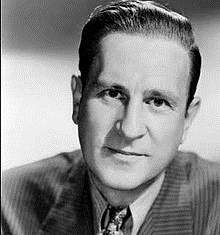
1974 – Actor/comedian Bud Abbott, the straight man of the comedy team of Abbott and Costello, died of cancer at the age of 76.
Abbott and Costello are among the few non-baseball personnel to be memorialized in the Baseball Hall of Fame in Cooperstown, NY. A plaque and a gold record of their legendary “Who’s On First?” sketch have been on permanent display there since 1956, and the routine runs on an endless video loop in the exhibit area.
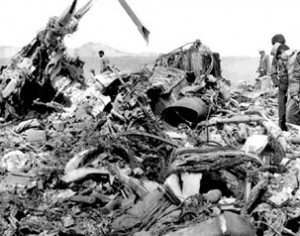
1980 – An ill-fated military operation to rescue 52 American hostages held in Tehran ended with eight U.S. servicemen dead and no hostages rescued.
With the Iran Hostage Crisis stretching into its sixth month and all diplomatic appeals to the Iranian government ending in failure, President Jimmy Carter ordered the military mission (Operation Eagle Claw) as a last ditch attempt to save the hostages.
During the operation, three of eight helicopters failed, crippling the crucial airborne plans. The mission was then canceled at the staging area in Iran, but during the withdrawal one of the retreating helicopters collided with one of six C-130 transport planes, killing eight soldiers and injuring five.
The next day, a somber Jimmy Carter gave a press conference in which he took full responsibility for the tragedy. The hostages were not released for another 270 days.

1990 – The Hubble Space Telescope was launched into low Earth orbit via Space Shuttle Discovery. Although not the first space telescope, Hubble is one of the largest and most versatile, and is well known as both a vital research tool and a public relations boon for astronomy. The HST is named after the astronomer Edwin Hubble.
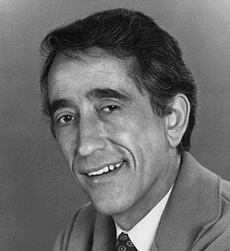
1997 – Comedian Pat Paulsen (The Smothers Brothers Comedy Hour, Pat Paulsen’s Half A Comedy Hour), perhaps best remembered for his numerous tongue-in-cheek campaigns for President of the United States, died of pneumonia and kidney failure. He was 69.
Compiled by Ray Lemire ©2018 RayLemire.com. All Rights Reserved.